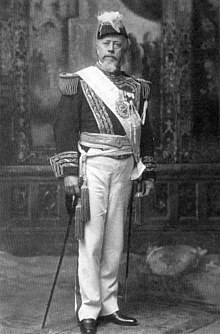General Julio Argentino Roca
| Julio Argentino Roca | |
|---|---|
 |
|
| 8th & 13th President of Argentina | |
|
In office October 12, 1898 – October 11, 1904 |
|
| Vice President | Norberto Quirno Costa |
| Preceded by | José E. Uriburu |
| Succeeded by | Manuel Quintana |
|
In office October 12, 1880 – October 11, 1886 |
|
| Vice President | Francisco Bernabé Madero |
| Preceded by | Nicolás Avellaneda |
| Succeeded by | Miguel Juárez |
| Minister of the Interior | |
|
In office August 6, 1890 – May 1, 1891 |
|
| President | Carlos Pellegrini |
| Preceded by | Salustiano Zavalía |
| Succeeded by | José Vicente Zapata |
| Minister of War and the Navy | |
|
In office January 4, 1878 – October 9, 1879 |
|
| President | Nicolás Avellaneda |
| Preceded by | Adolfo Alsina |
| Succeeded by | Carlos Pellegrini |
| Personal details | |
| Born |
July 17, 1843 San Miguel de Tucumán |
| Died | October 19, 1914 (aged 71) Buenos Aires |
| Political party | National Autonomist |
| Spouse(s) | Clara Funes |
| Children |
Julio Argentino Elisa María Marcela Clara Agustina Josefina |
| Parents |
José Segundo Roca Agustina Paz |
| Military service | |
| Allegiance |
|
| Service/branch |
|
| Rank |
|
Alejo Julio Argentino Roca Paz (July 17, 1843 – October 19, 1914) was an army general who served as 8th President of Argentina from 12 October 1880 to 12 October 1886 and 13th from 12 October 1898 to 12 October 1904. Roca is the highest representative of the Generation of '80 and is famous for directing the "Conquest of the Desert", a series of military campaigns against the indigenous peoples of Patagonia.
Julio Roca was born in the northwestern city of San Miguel de Tucumán in 1843 into a prominent local family. He graduated from the National College in Concepción del Uruguay, Entre Ríos. Before he was 15, Roca joined the army of the Argentine Confederation, on 19 March 1858. While still an adolescent, he went to fight as a junior artillery officer in the struggle between Buenos Aires and the interior provinces, first on the side of the provinces and later on behalf of the capital. He also fought in the War of the Triple Alliance against Paraguay between 1865 and 1870. Roca rose to the rank of colonel serving in the war to suppress the revolt of Ricardo López Jordán in Entre Ríos. President Nicolás Avellaneda later promoted him to General after his victory over rebel general José M. Arredondo in the battle of Santa Rosa, leading the loyalist forces.
In 1878, during Avellaneda's presidency, he became Minister of War and it was his task to prepare a campaign that would bring an end to the "frontier problem" after the failure of the plan of Adolfo Alsina (his predecessor). The Indians frequently assaulted frontier settlements and stole horses and cattle, and the captured women and children were enslaved or offered as brides to the warriors. Roca's approach to dealing with the Indian communities of the Pampas, however, was completely different from Alsina's, who had ordered the construction of a ditch and a defensive line of small fortresses across the Province of Buenos Aires. Roca saw no way to end native attacks (malones) but by putting under effective government control all land up to the Río Negro in a campaign (known as the Conquest of the Desert) that would "extinguish, subdue or expel" the Indians who inhabited there. This land conquest would also strengthen Argentina's strategic position against Chile.
...
Wikipedia
